Psychology Equity, Inclusion, and Community (PEIC) Committee
April 2022 Newsletter
Newsletters brought to you by the Outreach Subcommittee
The Outreach Subcommittee within the PEIC Committee is specifically focused on building connections between our Department and other Departments at Pitt as well as between our Department and the greater Pittsburgh community. One of our major initiatives is a Speaker Series which hosts presenters from outside of our Department who share their expertise on a variety of topics related to the PEIC Committee’s goals including interdisciplinary perspectives on diversity and how recruiting diverse and marginalized populations improves research. We also put together this newsletter to keep the Department apprised of upcoming events and other important information in the equity, inclusion, and community space.
Keep reading to find out about some of our new initiatives and reach out to Whitney Ringwald (wringwald@pitt.edu) and Sarah Aghjayan (sla63@pitt.edu) to get involved!
Let’s See How Far We’ve Come (Part 2)...
A few weeks ago, Dr. Julie Fiez, Chair of the Psychology Department, sent out the results from the most recent DEI climate survey (February 2022). We encourage everyone to take a look at the results if you have not yet had a chance to. While response rates for the most recent climate survey were low, especially among students and staff, we provide a few descriptive takeaways that may be useful to keep in mind as we continue working to make our Department a more equitable and inclusive community.
All items in the climate survey were rated on a 5-point scale, ranging from (1) Strongly Disagree to (5) Strongly Agree. The first chart on the following page (“Faculty & Student Perceptions of Actions being Taken by the Department (2022)”) suggests that relative to students, faculty members perceive that the department is doing a better job acting to improve DEI. Overall, students felt more strongly that while the department tries hard, it has trouble imagining what needs to be changed. Of note, students overall disagreed that people in the department would vocally object to sexist/racist comments made in departmental meetings and events. Chart 2, which shows changes in students’ perceptions over time (from 2018-2022) further demonstrates that students’ confidence that people would object to sexist/racist comments has actually been declining over the past four years. To improve DEI in this department, it is not enough to just participate in workshops, we must also do the work in real-time and call out racism and sexism when we see it.
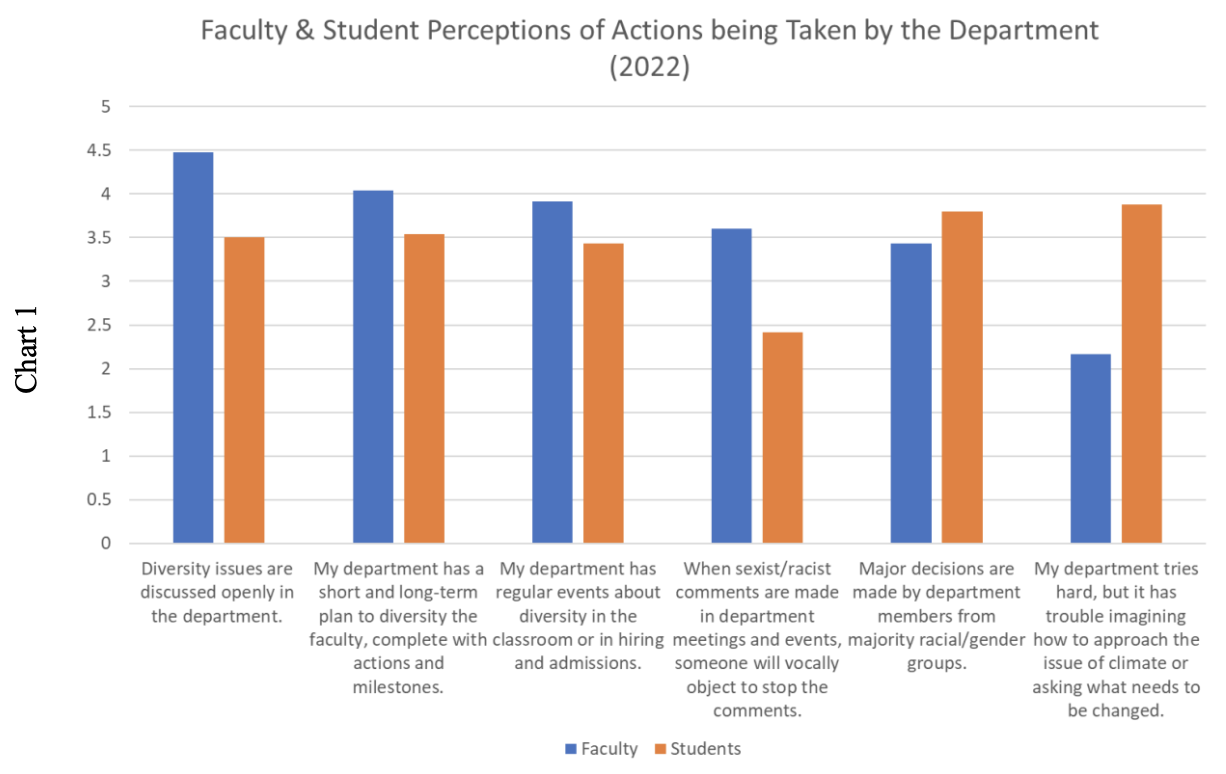
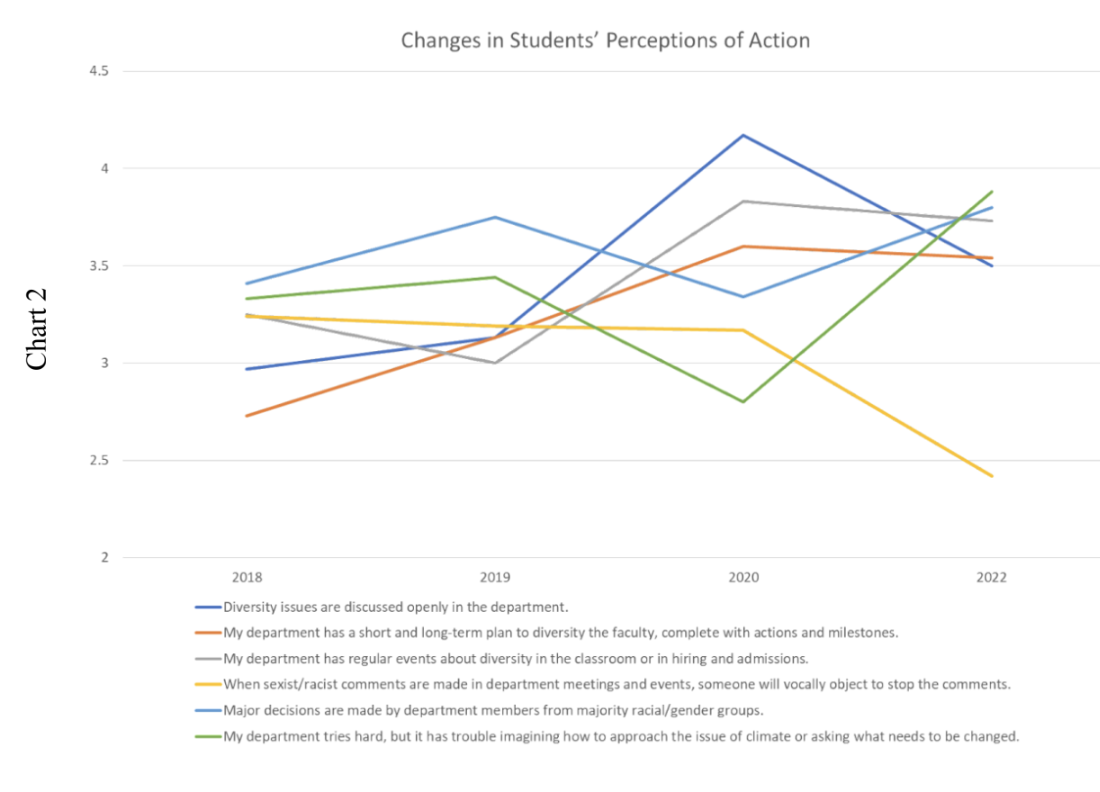
Chart 3 depicts changes in faculty perceptions over time (2018-2022); this chart generally shows that faculty members believe departmental actions to improve DEI have been steadily improving over the past four years, though in some cases action may have peaked in 2020. Chart 2 (changes in students’ perceptions) is less straightforward; greater variability in responses over time could be related to low response rates and less stability in the student population than the faculty population. Nonetheless, Charts 1 through 3 suggest that students and faculty members are not always aligned on how they view the departments’ progress towards DEI initiatives. More communication between faculty members and students may be important. Moreover, DEI initiatives in the department need to be led and attended by students AND faculty members for progress to be made.
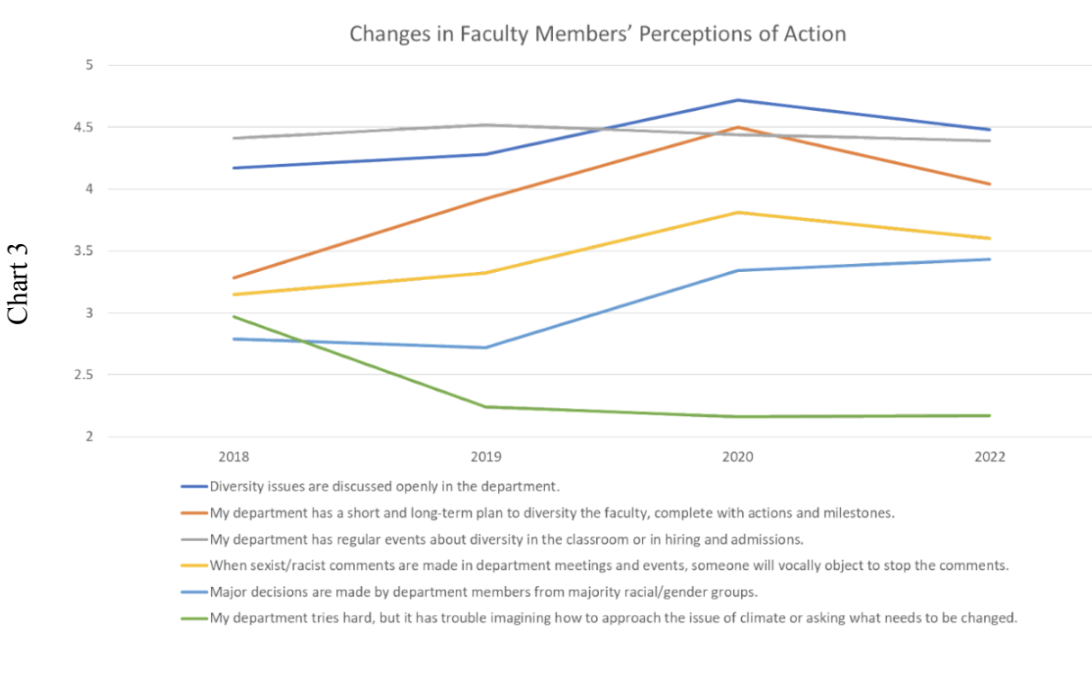
Finally, Chart 4 shows differences in perceptions of diversity, inclusivity, support, and belongingness between respondents (staff, students, and faculty members) who did not indicate belonging to a member of an underrepresented group in science as defined by NIH on the basis of socioeconomic and/or race/ethnicity background, and/or disability status (MRG) and respondents who did indicate belonging to a member of an underrepresented group in science as defined by NIH on the basis of socioeconomic and/or race/ethnicity background, and/or disability status (URG). Though MRG and URG respondents reported similar perceptions of limited diversity in the department, respondents from underrepresented groups in science overall reported feeling less respected and supported by the department, as well as less belongingness in the program. In addition to improving recruitment of diverse faculty members, students, and staff, we must work harder at supporting faculty, students, and staff from underrepresented groups and cultivate environments in which individuals feel respected, heard, and included. Overall, these findings show that while in some areas progress is being made, we still have a ways to go. To make real and lasting change, everyone must play a part. We look forward to continuing to work with you all to push progress forward this year!
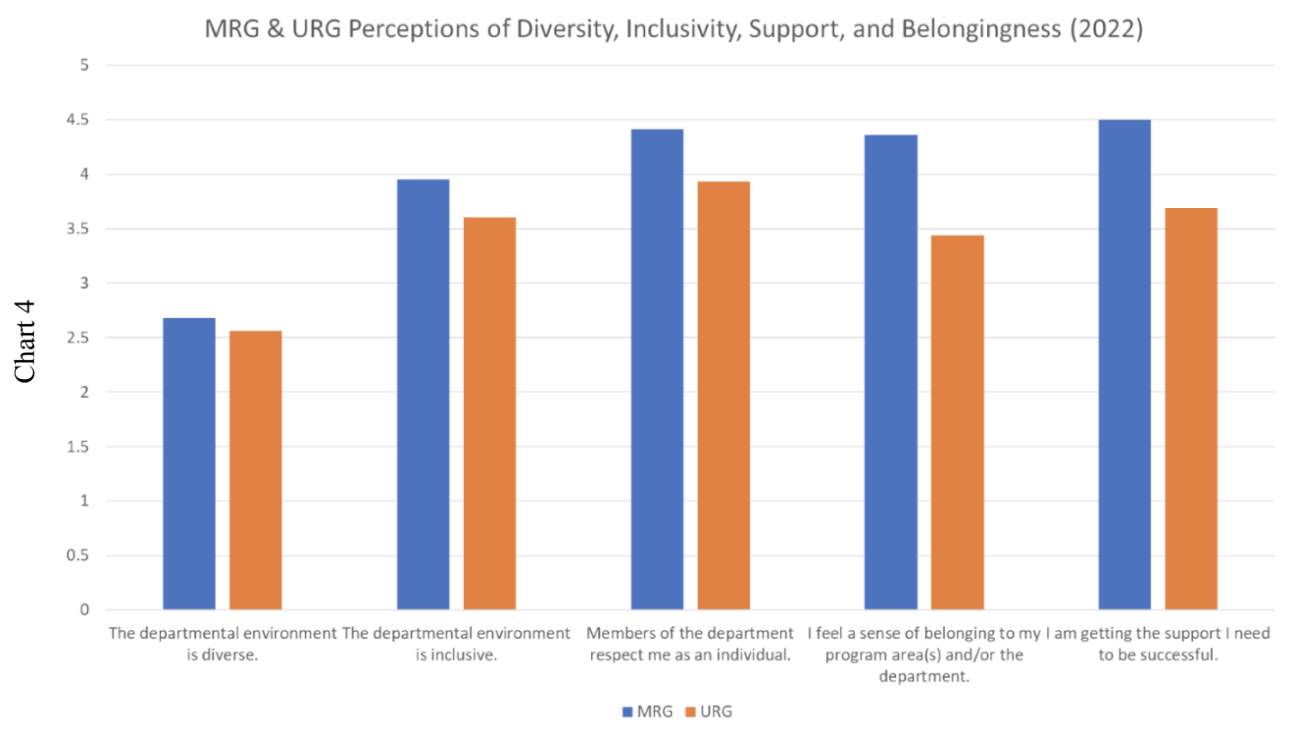
Updates on Initiatives from PEIC Subcommittees
Another Successful Open Lab Event
The PEIC Undergraduate Efforts subcommittee hosted an Open Lab Event for undergraduate students on March 15th. The purpose of this event is to break down barriers to participating in directed research in an effort to attract more students from underrepresented groups to the program. Close to 50 undergraduate students attended the event! Students traveled around Sennott Square to different lab spaces and learned about ongoing research in those labs. Many thanks to the participating labs: Karina Schumann’s Conflict in Interpersonal Relationships lab (represented by Jonah Koetke), Mandy Forest’s Communication in Close Relationships lab (represented by Kirby Sigler), Pete Gianaros’ Behavioral Neurophysiology lab (represented by Zak Hutchinson), Melissa Libertus’ Kid’s Thinking lab (represented by Shirley Duong), and Rebecca Reed’s Psychoneuroimmunology lab (represented by Maegan Nation). Thanks also to our PEIC undergraduate representatives Janelle Craig, Ana Jain, Emma Yoon, and Tola Gbadamosi for their help with the event!
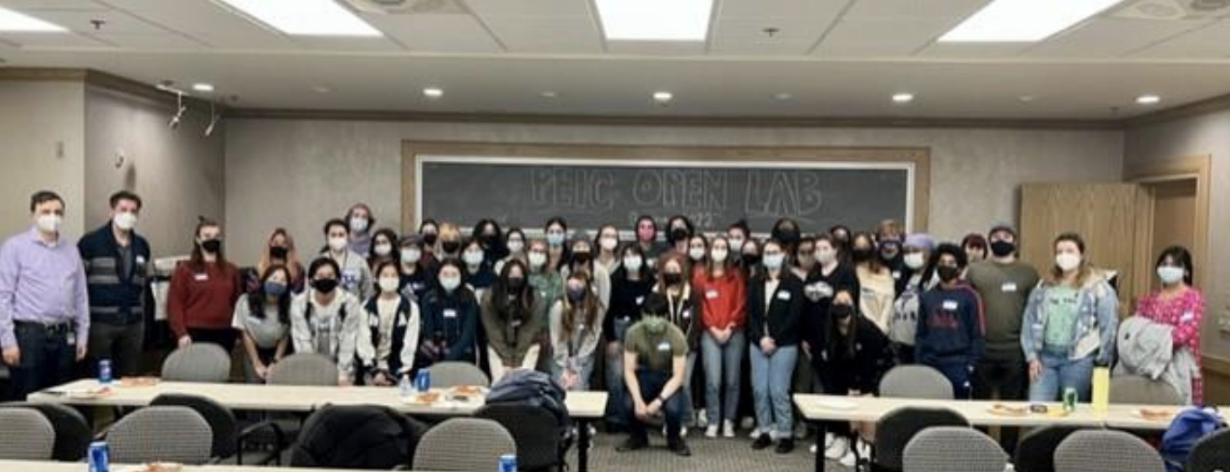
High School Partnership Initiative
The purpose of this initiative is to share our experiences/knowledge to support the learning and professional development of high schoolers. At this point, we're contacting schools and seeing who at Pitt (read: you!) would be willing and interested to potentially visit a classroom to answer questions, share your experiences, and offer advice to high schoolers in a relatively informal way. If this is something you have any interest in, please email Whitney Ringwald (wringwald@pitt.edu)! We'd love to get as many people involved as possible. In particular, it'd be great to have people join with diverse career paths to be able to speak to the different ways of becoming a professional.
Upcoming Events
May 9, 2022: 7pm - 8pm
Preserving Democracy: Disinformation, Disruption, and the Destabilization of Democracies
“Mr. Colaresi's work leverages the accelerating availability of computational tools, including machine learning and Bayesian approaches, along with unstructured information, such as from digitized text, to build and improve models of national security secrecy and oversight, international and intrastate violence, and changes in human rights over time.” Learn more and register here.
May 11, 2022: 11:30am-1:00pm
Community Research Advisory Board meeting
The Community Research Advisory Board (CRAB) is a group of faculty and community stakeholders convened by the Center for Health Equity that host monthly meetings to provide consultation to researchers interested in engaging community members in research projects. If you're a researcher who wants to work with the CRAB, contact Lora Ann Bray.
March 14, 2022: 2pm-5pm
The Race & ... Block Party
“We encourage you, your family, and your friends to come and enjoy a day full of good food, fellowship, and fun at the park. Our ultimate goal is to create a network of BIPOC excellence from the University of Pittsburgh, UPMC, and the city of Pittsburgh as a whole.” Learn more here.
May 16, 2022: 6:00 pm
DBLAC Reading Series - Mother Body: A conversation with Diamond Forde
“MOTHER BODY is an intersectional exploration of the trauma and agency held within a body defined by its potential to mother.” Learn more and register here.
July 25 - 28, 2022
Pitt Diversity Forum
This year's theme is "Rewiring Our Systems: Transforming the Intersections of Inequity." The forum will feature a dynamic array of keynote programs and community-led sessions that aim to develop social equity consciousness and systems thinking approaches. Programs will address the intersections of social identities and cultivate models for advancing social justice. The forum is entirely virtual and is free and open to the public. Learn more and register here.
Volunteering & Donation Opportunities
#PghUnitedForUkraine
United Way of Pittsburgh is launching the United for Ukraine Fund in response to this urgent and growing humanitarian crisis. The immediate support will cover: transportation, shelter, food and medicines, critical childcare supplies, including infant formula and diapers, hygiene kits, and more. Learn more here.
Sarah Heinz House
Sarah Heinz House on the North Side of Pittsburgh offers more than 100 quality, after school and summer programs for kids, grades 1 through 12. They are open afterschool, in the evenings, and on Saturdays and offer access to a variety of educational, health and fitness, and other programs in addition to tot and preschool classes. Learn more here.
Community Forge
The mission of Community Forge is “Building an equitable economy for Wilkinsburg and the Greater Pittsburgh region by creating opportunities that promote professional development, financial wellbeing, and entrepreneurial growth. We believe in participatory programming that gives voice to those we serve, breaking down silos between communities, and developing equitable pathways to economic success.” “Your dollars and labor will go directly to supporting free community programming, beautifying our grounds for all to enjoy, and subsidizing community service organizations. Currently, we are fundraising to help support sustained building operations through COVID and continue to expand our service to minority entrepreneurs in our region.” Learn more here.
Looking for other opportunities?
Find other organizations to donate to in this Google Doc!
Wishing everyone a happy and healthy summer!